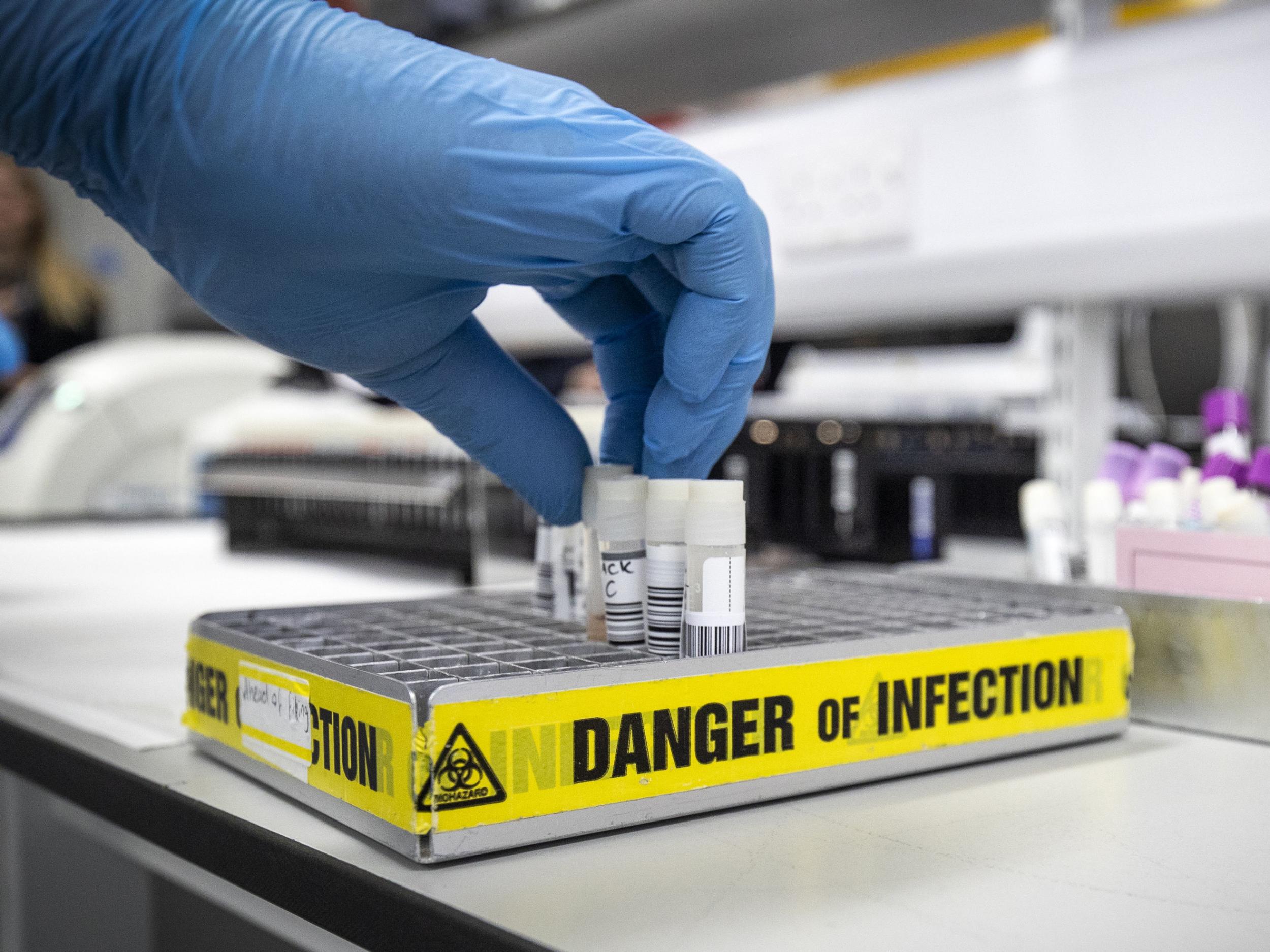
Widespread testing for coronavirus has been suspended among staff and patients at hospitals and GP practices serving 3.5 million people because of a shortage of vital chemicals.
On the day Boris Johnson unveiled a new target of 200,000 Covid-19 tests a day by the end of May (before backtracking and clarifying it was a target of capacity, not testing), pathology services in south London – including four major hospitals and hundreds of doctors’ surgeries – have been forced to impose restrictions on testing both in hospitals and in the community.
And the head of NHS Providers, which represents hospitals, warned that the government’s crude targets were putting hospitals across the country at risk of the same shortages, as testing was aimed at high overall numbers rather than where need was greatest.
Download the new Independent Premium app
Sharing the full story, not just the headlines
A leaked email to NHS staff from the South West London Pathology Partnership has confirmed only patients and staff who show symptoms will now be tested for Covid-19 after the labs, based at St George’s Hospital, were unable to source enough of the chemical reagents needed for the tests.
The suspension of routine testing for coronavirus means patients and staff who are infected but yet to show symptoms will not be tested and could spread the virus. The government had ramped up testing of all staff and patients at the end of April ahead of the 100,000 tests target set by the health secretary, Matt Hancock.
One NHS worker in south London, who shared the email with The Independent, said testing had been dramatically increased in their hospital before the 100,000 target deadline on 30 April, adding: “If we have a limited resource, then we should ensure that it is used to best effect to protect patients from harm.
“It appears that political motives have impacted on the prioritisation/utilisation of resources. Not testing patients on admission will increase the risk of transmission.”
The shadow health minister, Justin Madders, said: “If we are looking at a relaxation of the lockdown rules next week, then the only safe and sensible way to do that is by making sure a robust test, trace and isolate strategy is in place first, and that sufficient testing is available.
“These alarming reports suggest we will actually go backwards in terms of testing. We need urgent clarification from the government on this – public safety should not be put before political expediency.”
The issue of testing was a key battleground during Wednesday’s prime minister’s questions, with new Labour leader Keir Starmer criticising the government’s claim it had met its 100,000 target as numbers had fallen below that level every day since.
No hype, just the advice and analysis you need
Mr Starmer said the UK was “slow into lockdown, slow on testing, slow on tracing and slow on the supply of protective equipment”, adding the government had not “got to grips” with the problem in care homes, where deaths continued to rise.
Mr Johnson said his ambition was to get to 200,000 tests a day by the end of May and to then go even higher. But just hours later, Downing Street said the target referred to lab capacity, rather than individual tests.
The government’s testing regime is coming under intense scrutiny ahead of any planned changes to the UK lockdown with Chris Hopson, chief executive of NHS Providers saying the strategy is “now out of date and desperately needs updating.”
He said: “Some of the 217 trusts NHS Providers represents still can’t get regular, consistent, access to tests for all their patients and staff showing Covid-19 symptoms within the turnaround times they need.
“As the government’s own 4 April testing plan acknowledged, these groups should be our top testing priority. But in too many places, due to testing facilities being too far away and capacity constraints in individual laboratories, thousands of people who need testing each day simply aren’t being tested and results are taking too long to return.”
The South West London Pathology Partnership provides testing for St George’s Hospital, Kingston Hospital Foundation Trust, Croydon Health Services Trust and Epsom and St Helier Hospitals Trust. It also serves more than 200 GPs across the capital.
The message to staff, sent on Monday, said: “As you know, we have significantly increased patient and staff swabbing for Covid-19 over the past week.”
It said that due to “high demand for reagents at present, and to ensure we can continue to provide Covid-19 testing for key groups over the coming week” management at all four hospitals had agreed to stop swabbing asymptomatic staff both in hospital and the community for Covid-19. Staff who have symptoms will still be tested.
It also said there will be no repeat tests for patients to confirm they are free of the disease or remain infected and no tests for patients admitted to any of the hospitals, which will only be able to order tests for patients who have symptoms.
The email added: “Emergency departments should stop swabbing all patients for Covid-19, and only swab those patients who will be admitted with Covid-19 related symptoms. Wards should only swab those patients who develop new Covid-19 compatible symptoms, and who were Covid-19 negative or not tested before.”
Patients being discharged to care homes will continue to be tested.
A spokesperson for South West London Pathology said it was “continuing to offer Covid-19 testing to all symptomatic patients and staff at St George’s, Epsom and St Helier, Croydon and Kingston Hospitals, as well as the Royal National Orthopaedic Hospital and South West London and St George’s Mental Health NHS Trust.”



